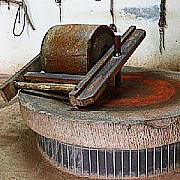johnwang wrote:要知不用力则可,不用意则不可,乃畏对方之击动而起, 殊不知精神已接受被击,安得不为人击中乎?
Let me try to translate this.
You have to know that it's OK not to use your "force", but it's not OK not to use your "intention". If your move is just to response to your opponent's attack, your mind has already accepted the fact that you have been hit, how can you not be hit by your opponent as the end result?
This one I would call good translation, although it would be good if the word fear remained there.
It make no sense to me at all.
Well, as I said before, WXZ was better in talking paradoxes than using very precise logic. In fact most of his students couldn't understand much of what he was trying to say

Only because they witnessed his abilities and skills, they believed he knew what he was saying

Fortunately a few of them achieved quite high level and were able to communicate better than Wang



 Only because they witnessed his abilities and skills, they believed he knew what he was saying
Only because they witnessed his abilities and skills, they believed he knew what he was saying 

 Please say you're weren't serious?
Please say you're weren't serious?

